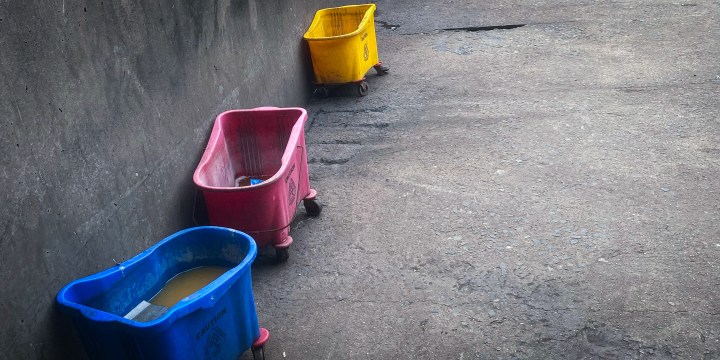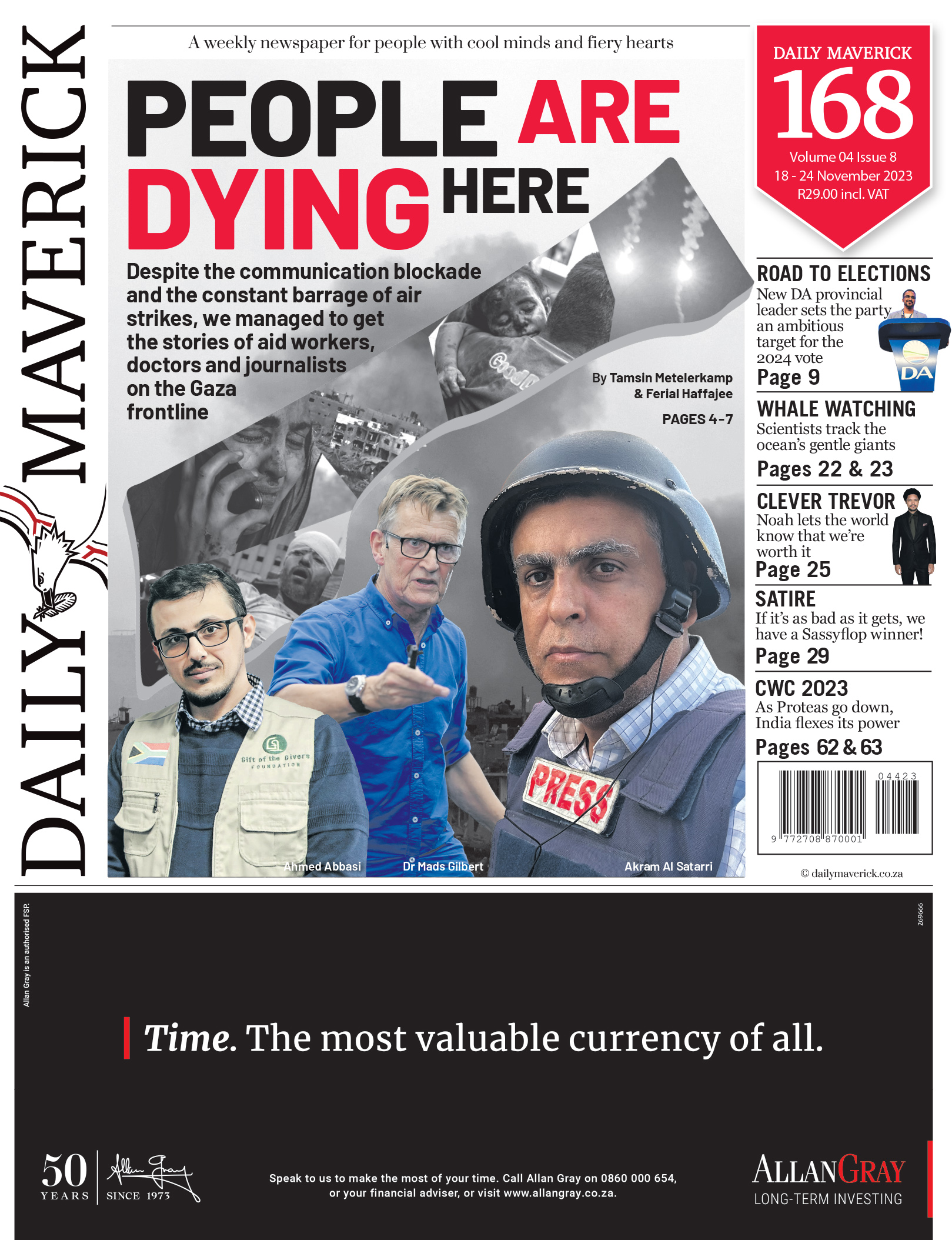DAMNING INDICTMENT
The long drop to indignity — why Durban’s public toilets are a dark stain

The city’s public facilities have not improved, forcing people to come up with their own plans.
Few people in Durban’s Warwick Avenue Triangle were likely to celebrate World Toilet Day on Sunday, 19 November. Even fewer will know of Bindeshwar Pathak, the global toilet guru who died in India in August.
I paused to salute the man as I walked through Warwick this week to revisit the filthy public latrines there. The state of the country’s public toilets is a damning indictment of the political establishment’s disdain for millions of poor people who are forced to relieve themselves in public every day.
Patrick Ndlovu, the cofounder of Asiye eTafuleni, an NGO that works with street traders, said things have worsened since he first showed me the public toilets in 2019.
It made me think that South Africa needs a toilet champion like Pathak, who I met in 2017 on a trip to New Delhi. Pathak dedicated his life to toilets, building a global enterprise based on lavatories.
His Sulabh International Social Service Organisation targeted millions of “untouchables” in India, people preordained by caste to spend a lifetime in penury, cleaning toilets and, in the absence of water-borne sewerage, removing buckets of night soil.
“They lived in colonies, away from everyone else. Every day they carried buckets of night soil around on their heads. It stank and it slopped around and spilt on them. It was a life of hell on Earth,” Pathak said.
As a child, he touched an untouchable and was harshly rebuked by his grandmother, who made him drink cow’s urine as punishment. It focused his mind on the pernicious caste system.
Pathak figured that ending the unjust treatment of untouchables was more likely to come from innovation than by changing the social order. He found a book written by a World Health Organization engineer, Edmund Wagner, who concluded that, in the absence of water-borne sewerage, pit latrines were the most viable form of sanitation for the developing world.
Pathak and his engineers came up with a two-pit latrine in 1973 that cost the equivalent of $10 to build. Sulabh reskilled untouchables to earn much more cleaning less-filthy toilets and to spread the sanitation gospel in a rapidly overpopulating world.
Sulabh has built more than 1.5 million pit latrines as far afield as China, Afghanistan and South Africa. It also built 7,500 public toilet blocks in India that are maintained around the clock. “You have to have someone working in them 24/7 or they will be vandalised,” Pathak said. “You have to clean them, dispense soap and toilet paper. It will not work if you don’t do that.”
Pathak said Sulabh employed people in 1,600 branches around the world, providing toilets to 10 million people a day.
“When I came on the scene, toilets were not talked about. It was a cultural taboo to talk about them and they weren’t part of the architecture. Most homes had outhouses. Now Bill Gates talks about toilets.”
The Bill and Melinda Gates Foundation is involved in programmes to create safe and sustainable sanitation. It runs the Reinvent the Toilet Challenge, which grants funding to recipients trying to solve the crisis.
According to the United Nations, 3.5 billion people live without safe toilets and 419 million people defecate in the open. Unsafe water, sanitation and hygiene causes the deaths of about 1,000 children under five every day. Pathak said the Indian government was supportive of Sulabh, but it seldom championed the cause – a bit like in Durban, where few, if any, councillors and officials care about the people in Warwick. “They seldom come here,” said Ndlovu, his boots squelching through filthy sludge on the pavement. “If they did they would see this.”
Do it yourself
A year ago, Ndlovu and colleague Richard Dobson built a pissoir from pallets, shade cloth and bits of PVC guttering connected to a plastic drum. It is installed next to a public toilet that is often broken.
It was modelled on a makeshift public toilet set up by taxi rank marshall Thulani Ngcobo five years ago. Fed up with the stench of urine, Ngcobo fastened a few metres of green shade cloth to a palisade fence adjoining a wall and put five 20-litre buckets there. Now hundreds of men relieve themselves there every day. Ngcobo pays a homeless man R50 to empty the urine into the stormwater drains twice a day.
On a pedestrian bridge leading to the Early Morning Market, Doctor Mkhize and his homeless friends have set up a similar arrangement for patrons to pee into eight buckets – and they often leave a tip.
It is ridiculous that the City doesn’t have enough respect for the people to provide them with a dignified place to relieve themselves.
These makeshift toilets are much used because the public toilets either don’t work or are filthy, or there are long queues to use them. Ndlovu pointed out a municipal toilet that has been closed since 2017.
The municipality set up a public convenience in two shipping containers next to the broken toilets. There, Musawenkosi Ngcongo busies himself cleaning. When the taps run dry he fetches water to flush the toilets.
“People are so happy that I clean up all the shit,” said Ngcongo. Municipal cleaners are supposed to do this work but they seldom do, which suits him because of the tips he gets from grateful users.
Read more in Daily Maverick: Durban agrees to provide ‘action plan’ on sewage pollution — one year after the floods
The state of public toilets was indicative of bigger water and sanitation problems in Durban, said Dobson. “It is demeaning that people have to experience this. The City seems to be doing nothing to fix it, which is why people like Ngcobo did what he did. People come up with solutions in the absence of a functioning state.”
Dr Mary Galvin, a senior research associate at the University of Johannesburg, is a water sanitation expert who has worked in Durban. She said civil society, NGOs and the private sector were increasingly plugging service delivery gaps.
“It is ridiculous that the City doesn’t have enough respect for the people to provide them with a dignified place to relieve themselves. It shouldn’t be up to NGOs to come up with water and sanitation solutions, but thank goodness they are.” DM
Five facts about toilets since antiquity
- The first water-borne sewerage system in the world appears to have been in operation in Pakistan in 2500 BCE;
- John Harington, a Briton, developed the first flush toilet in 1596;
- The Black Death, or bubonic plague, killed more than 75 million people between 1346 and 1353. One theory is that it spread rapidly because of poor sanitation;
- The Japanese have invented a toilet with an MP3 player that also incinerates human waste to a spoonful of ash;
- A conventional toilet uses between five and 10 litres to flush.
-

Page 1. Front page DM168. 18 November 2023















 Become an Insider
Become an Insider
Pre 1996 we had fairly decent public toilets. Since then it’s been downhill.
Go ANC, we’re proud of you and your ceaseless contribution to South African greatness.
I’ts a no brainer. You vote ANC. This is what you get – automatic. It can’t be anything else.
This is such an important issue – the neglect of public toilets across our cities is shameful. Interesting to see the informal arrangements that arise instead. A gender lens on this would reveal another set of indignities and failures – what arrangements women are having to make under these conditions. I agree we need a toilet champion!
Unfortunately, despite clear evidence of a political party that does not have the slightest interest in people’s welfare or the delivery of the most basic of public services, there are those that will continue to vote for the ANC. It’s insane.
Africa is a frustrating continent when it comes to what one would consider ‘common sense’.
If a restaurant continues to serve horrible meals, the patrons do not go back.
If a shop continues to short-change their customers, the customers do not go back.
When a liberation organisation ‘frees’ the people, followed by treating them with disdain, no meals, stealing the taxes, or denying them water, sanitation and power, their loyalty to their liberators and elders turns a blind eye to their abject discomfort.
Hopefully, the Multi-Party Charter has Africans who know how to break this way of thinking, to free the citizens of the ruling ANC and then start on the path to recovery of basic services and dignity.